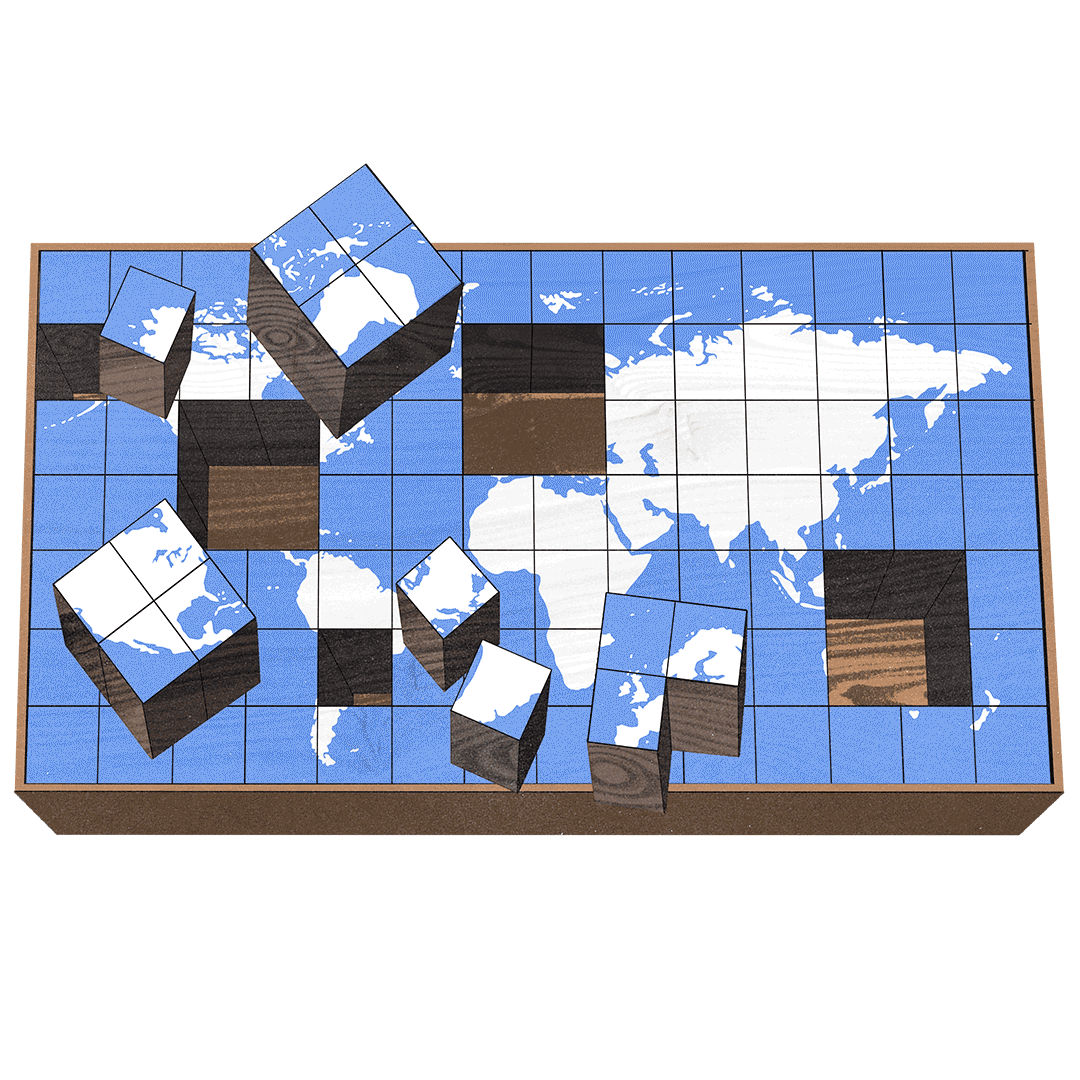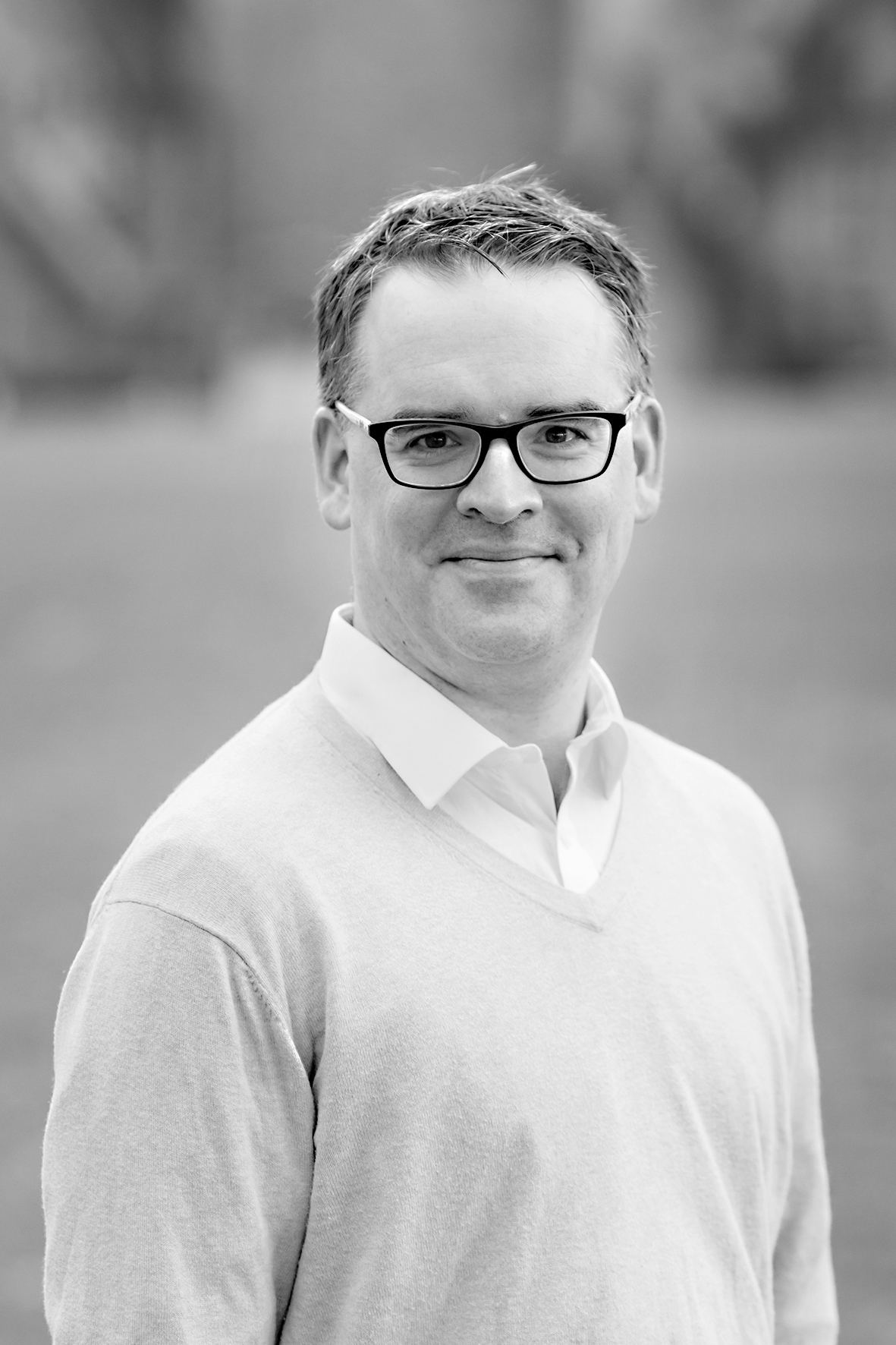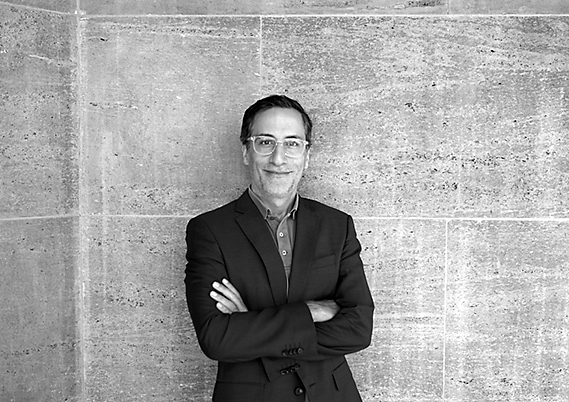
THE GREAT REGROUPING OF THE WEST
“We have the opportunity to create a new free world“
Thomas Weber, professor of international politics, calls for a reorientation of the "West": we need to cooperate more with democracies in Asia and the global South, for example with regard to free trade, energy supply and the fight against poverty.
INTERVIEW: ALEXANDER GÖRLACH
ILLUSTRATION: EMMANUEL POLANCO/SEPIA

THE GREAT REGROUPING OF THE WEST
“We have the opportunity to create a new free world“
Thomas Weber, professor of international politics, calls for a reorientation of the "West": we need to cooperate more with democracies in Asia and the global South, for example with regard to free trade, energy supply and the fight against poverty.
INTERVIEW: ALEXANDER GÖRLACH
ILLUSTRATION: EMMANUEL POLANCO/SEPIA
Mr Weber, the war in Ukraine has given a new urgency to the so far mainly philosophical question “What is the West?”. The democratic countries have closed ranks in the confrontation with Russia; can this accelerate awareness in the search for our identity?
The war in Ukraine does not so much accelerate but change our awareness – and that is a good thing. Before the war, the search for identity was going in the wrong direction, especially in Germany. Liberals like me, who, for years, had been calling for a free world that is willing and able to defend itself, were labelled bellicose or worse. Transatlantic thinking was not fashionable. And the experiences of our Central and Eastern European neighbours were not even listened to. For example, when I discussed Germany's role in the world with notorious Russia sympathisers (now derogatively called “Russlandversteher”) at an "NZZ" forum in Berlin in 2014, I demanded that we learn to see Poland as more than just the country of our cleaning ladies and listen to how our eastern neighbours think about the world. No one clapped. The Russia sympathisers received enthusiastic applause from the audience, but when I said that if push comes to shove we had to be prepared to use military force to defend our eastern neighbours, a deafening silence reigned in the hall.
What has the war in Ukraine changed in that regard?
Everything. We suddenly listen to our Eastern neighbours, even if they are not in the Kremlin. And the Ukrainian President Volodymyr Zelensky has fundamentally changed the public image of Eastern Europeans within weeks. Suddenly it's cool to be like him, like Eastern Europeans. We must not let this moment pass. We suddenly have the chance to create a new free world that stretches from Silicon Valley to Kharkiv and from Tierra del Fuego to the North Cape. We must build this new free world both in our minds and in reality as quickly as possible.
After 50 years of going in the wrong direction politically, the Social Democrat’s Russia policy is in shambles. The dependence on Russian gas began as early as Willy Brandt's time. Angela Merkel, in cooperation with the business community, even wanted to increase it. It was only after the Russian invasion of Ukraine that Nord Stream 2 was dropped. What new Russia policy can be built in Germany now?
There has to be a double strategy, containing Putin and his clones while at the same time being open to Russia. A new Ostpolitik doesn’t mean rejecting everything done by Willy Brandt, but we should read more George F. Kennan. As the American diplomat wrote from Moscow as early as 1946, hard containment and deterrence are needed to build and defend a free world. And this phase can take a long time in the worst case. At the same time, however, it must always be clear that our policy is only directed against the authoritarian Putins of the world, never against Russia. That is why it is a mistake to include Russian civil society in sanctions and, for example, to break off cooperation with Russian universities. We must not allow ourselves to switch from pro-Russian blindness to anti-Russian orientalism. There are many great Russian traditions that would enrich the free world of the future.
Such as?
For example, it was Tsarist Russia that brought the countries of the world together to curb barbaric warfare. Putin likes to see himself in the tradition of Russian Tsars, but given his war atrocities in Ukraine, Putin is the heir to Hitler and Stalin, not the Tsars. Heinrich August Winkler is wrong when he states there is a fundamental difference in civilisation between the West and the Orthodox East.
We need a free world that builds on both positive Western traditions and the experiences of the democracies of Asia and also the global South.
We need a free world that builds on both positive Western traditions and the experiences of the democracies of Asia and also the global South.
In your opinion, what should be the goal of a new Russia policy?
It should definitely not aim to permanently prevent energy supplies from Russia to Europe. The important thing is that the volume of these supplies must never be so large that non-Russian Europe becomes politically dependent on Russia. In other words, in a situation like now, it must always be possible to do without Russian energy temporarily. But at the same time, we must always keep a place for Russia in the free world.
But who is “we”? Free Europe, the Christian West, the Transatlantic area, the West? The ideologies and ideas behind these terms stem from a failed political world. Shouldn't a new “we” that wants to be effective against the autocrats and dictators of this world also include Asian democracies?
My sentiments exactly. I deliberately spoke of the free world, not of the West. We need a new free world that consciously and self-confidently builds on the positive traditions of the West, but at the same time overcomes the dark underbelly of the West. And for that, we definitely need to include the traditions of Asia’s democracies. During the pandemic, we have just learned from Taiwan and South Korea how much the free world can learn and benefit from the democracies of Asia. We are also learning from these countries how real digitalisation of democracy can work. We need a free world that builds on both positive Western traditions and the experiences of the democracies of Asia and also the global South. I therefore call for a new transatlantic world that also includes Latin America and Africa. This new transatlantic world must be part of a free world.
The most decisive reactions to Russian aggression, however, come from the “old democracies”. The global South stands on the sidelines, as does Latin America. If the free world is now heading for a systemic conflict with the autocracies of our time, shouldn't it bring along the countries that form a third group?
Yes, that is true. Going further still, it was mainly the democracies of the English-speaking sphere, parts of Scandinavia and the countries of Central Europe that reacted decisively to Putin's war of aggression. The Western European countries of the original European Community acted so half-heartedly at first that Putin could have long since held a victory parade in Ukraine if everyone had been like that. But moments of crisis can provide an opportunity to quickly put change into action and bring countries – in this case the countries of Western and Eastern Europe – back together. We must have the same goal in dealing with the countries of the global South and Latin America.
And how do we do this practically speaking?
There are two things we can do ourselves: we in the old West must always be self-critical, but we must not hate ourselves. Who wants to be with someone riddled with self-loathing. And we need to listen more to the countries of the “third group” you speak of, just as we need to engage more with the experiences of the countries of Eastern Europe. If people in the countries of the global South feel taken seriously and treated with dignity, it will be much easier to create a new free world.
There is the idea of a “League of Democracies”. It has prominent supporters such as the American President Joe Biden. It is about the community of values of democracies, no matter where in the world, no matter what ethnicities, religions or languages. They are all committed to human dignity, freedom, the constitutional state and the rule of law. Is this not worth deepening and institutionalising?
I have always found the idea of such a league charming, but I fear that it works better in theory than in practice. In the best-case scenario, such a league would be so attractive that more and more countries would want to join and such a dynamic would develop that democrats everywhere would be strengthened domestically in their confrontation with autocrats. If that were to work, such a league would be wonderful.
But you seem to have objections.
I fear that there would be endless arguments about how to institutionalise such a league, which would do more harm than good. I fear even more that people in countries that would not be allowed to join right away would feel excluded. And that would then support not the democrats, but the autocrats, of all groups. As in the systemic conflict between 1917 and 1991, enemies of liberal democracies would campaign against the League everywhere and claim to be the better, the true democrats. The history of past centuries teaches us that gradual reforms have a higher success rate and, above all, are associated with less bloodshed than great founding acts or revolutions. It doesn't sound sexy, but it can be. For it to be just that, we must be wholeheartedly and passionately committed to creating a new free world.
A new free world cannot be created by a founding act. But new agreements and joint action would gradually make it a reality. What are we waiting for?
A new free world cannot be created by a founding act. But new agreements and joint action would gradually make it a reality. What are we waiting for?
We are already hearing about the United Nations what you are predicting about a league of democracies: that it is a club everyone can join, but which therefore does not make any substantial progress. So what can be done? How can the free world sharpen its identity, not only in a spiritual sense, but also in real, measurable and politically tangible terms?
Above all, through daily action. This starts at home, not only by saying that we are providing Ukraine with heavy weapons for self-defence, but by actually putting this into practice, no excuses. We should also show more strategic ambiguity towards Putin and other enemies of the free world. We had become too predictable. In doing so, we unintentionally made it too easy for the enemies of the free world to wage wars of aggression. Together with our partners from all over the world, we have to fight every day in international organisations to establish the standards and values of the free world.
What does that mean exactly?
It means we cannot just talk the talk, but actually have to come together with partners around the world, look for common ground instead of focussing on our differences and take concrete action together. For example, we should immediately sit down with our partners in the West and East and in the global South and conclude new free trade agreements. We also need agreements on energy supply, on protecting trade and transport routes and on fighting poverty. A new free world cannot be created by a founding act. But new agreements and joint action would gradually make it a reality. What are we waiting for?

Thomas Weber is Professor of History and International Affairs and Director of the Centre for Global Security and Governance at the University of Aberdeen. He is also a Senior Associate at the Centre for European, Russian and Eurasian Studies at the Munk School of Global Affairs and Public Policy at the University of Toronto. His book „Als die Demokratie starb: Die Machtergreifung der Nationalsozialisten - Geschichte und Gegenwart“ (240 pages, 20 euros) will be published by Herder in autumn.

Alexander Görlach holds a doctorate in linguistics and religious studies. He works as a journalist and is a senior fellow at New York's Carnegie Council for Ethics in International Affairs.

Thomas Weber is Professor of History and International Affairs and Director of the Centre for Global Security and Governance at the University of Aberdeen. He is also a Senior Associate at the Centre for European, Russian and Eurasian Studies at the Munk School of Global Affairs and Public Policy at the University of Toronto. His book „Als die Demokratie starb: Die Machtergreifung der Nationalsozialisten - Geschichte und Gegenwart“ (240 pages, 20 euros) will be published by Herder in autumn.

Alexander Görlach holds a doctorate in linguistics and religious studies. He works as a journalist and is a senior fellow at New York's Carnegie Council for Ethics in International Affairs.
Also interesting
Karl-Heinz Paqué // Die Globalisierung stockt und stottert
Die weltwirtschaftliche Integration steckt in einer Krise. Da muss sie raus – verändert und verbessert. Den Weg dahin kann der marktwirtschaftliche Westen ebnen, auch durch wertebasierte Geopolitik.
Sascha Tamm // „Die Wirtschaftslage wird die amerikanischen Wahlen entscheiden“
Frauen haben zunehmend das Sagen bei den Midterm elections, glaubt David R. Goldfield. Ein Grund dafür, warum die Demokraten hoffen dürfen. Der Historiker wagt einen Ausblick auf die anstehenden Wahlen in den USA.
Wolfram Eilenberger // Dem Lichte zugewandt
Der russische Angriff auf die Ukraine ist eine Zeitenwende wie 1989. Jetzt muss Europa die Freiheit wie ein zartes Pflänzchen beschützen.
